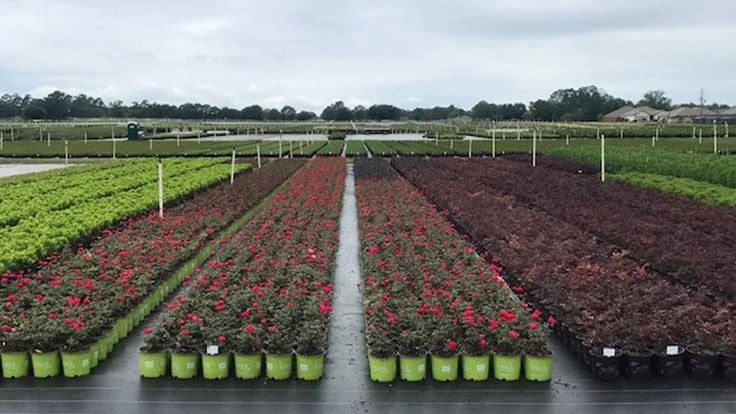
Photo courtesy of Tom Dodd Nurseries
Scale insects, of the order Hemiptera (super family Coccoidea), are 1/8 to 1/2-inch-long pests named for the protective waxy coating, or armor, that covers their bodies. More than 6,000 species inhabit the globe, 1,000 of which can be found in North America. Scale insects can be separated by armor type: They can have a hard outer shell, or a softer, waxier body covering. These pests are piercing/sucking insects that destroy a wide variety of plants by consuming plant sap.
Flint Johnson, production manager at Tom Dodd Nurseries, Inc., has become familiar with scale in his more than 30 years in the horticulture industry. He says that scale reduces the aesthetics and salability of plants by yellowing and wilting leaves, along with stunting their growth. In addition, Johnson says, "Scale produces honeydew, which attracts ants … and the ants protect other pests, such as aphids." To add insult to injury, the grower says, scale leaves spots on plants and hangs onto leaves even after they're dead, rendering them unsellable. "Everyone we talk to has problems with them; scale is a major issue."

Until he started using Ventigra® insecticide.
"We had super-great results really fast; it was totally unreal," Johnson says. "We cut the problem down to 10% really quickly. I told a friend who had scale on a magnolia he had just bought up the road about Ventigra, and in a week his scale issue was gone. He was overjoyed.
The active ingredient in Ventigra — afidopryropen — is a foliar insecticide that disrupts feeding and other behavior in insects. According to the Minnesota Department of Agriculture, afidopryropen can be "expected to control new and emerging pests, pests with known resistance concerns, and may serve as an alternative to organophosphates and neonicotinoids."
Johnson says that the advantages of using Ventigra insecticide extends to more than just dramatic results in a short amount of time. "Ventigra takes care of our aphids and whiteflies, and saves on time and labor." And once the company started using Ventigra, he says, his team was able to reduce spraying overall. "Our sprayer loves it," he says, "we go 28 to 30 days without spraying at all. That's unheard of.
The first line of defense in preventing pests such as scale, the grower says, is making sure that all incoming plants are clean, and regularly scouting existing plants in the greenhouse. And if scale is showing up in the greenhouse, there's a protocol for when to spray: It should occur in the "crawler," stage, he says.
"The thing I see people do over and over that frustrates me is using insecticide at the wrong time. If you're spraying scale when they're not crawling, you're wasting your money. But if everybody [in the greenhouse] is participating and you make sure you're spraying in the crawler stage, that will make a huge difference," Johnson says.
The grower says that his overall approach to pest control is starting early and being proactive rather than reactive. "With prop [propagation], you make sure that your first line of defense is there — you monitor, you keep it clean, have an approach that is preventative rather than curative," he says.
He says he tries to avoid using harsh chemicals in the greenhouse, but sometimes that's not an option. "We do occasionally have to use the harsh things —I don't like to, but sometimes we have to. When we do, we don't do the whole nursery." Ventigra helps to cut down on the need for those kinds of treatmeans, he says .
An important element in using Ventigra insecticide (as is true of all pesticides) Johnson says, is rotating it with other pest-control methods, to avoid resistance issues. "You will need to spray less [when using Ventigra insecticide], but you still need to rotate what you're using. Besides, we want Ventigra to be around for a long time!"
Latest from Greenhouse Management
- USDA fires experts on invasive pests, including Asian citrus psyllid, chilli thrips
- CEA Alliance celebrates bipartisan introduction of Supporting Innovation in Agriculture Act
- Dümmen Orange North America celebrating 25th anniversary in 2025
- CEA HERB Part 1: Best management practices for culinary herbs
- Lawsuit challenges new H-2 visa rules
- CEA HERB Part 2: A guide to increasing the sowing density of culinary herbs
- Illinois Landscape Contractors Association changes name to Landscape Illinois
- 2025 Proven Winners Horticulture Scholarship applications now open







